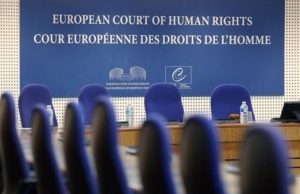By: Genna Amick,
Journal of Global Rights and Organizations, Lead Articles Editor
ISTANBUL, Turkey – The European Court of Human Rights (ECHR) recently released a decision involving a sexual abuse case that began nearly two decades ago. On January 8, 2003, a Turkish individual identified only as N.Ç. filed a complaint against two women who forced N.Ç. to engage in prostitution alongside them.

After an investigation was conducted, the prosecutor in the case filed a bill of indictment against twenty-eight individuals on various charges, including raping a girl who was under fifteen years old, falsely imprisoning a person to fulfill sexual desires, and inciting someone to prostitution. In 2010, after thirty-five hearings, the Mardin Assize Court acquitted several defendants, struck certain charges, such as “consensual imprisonment” and incitement to prostitution, and held that the sexual acts could not affirmatively be deemed nonconsensual as a psychiatric report found that N.Ç. “had not been totally unwilling.” On this basis, the Mardin Assize Court imposed on defendants the minimum sentence outlined in the Criminal Code.
On March 25, 2011, an application was submitted to the ECHR based on a complaint regarding the manner in which N.Ç.’s case was handled by the Mardin Assize Court. The application sought relief based on Article 3, which prohibits inhumane or degrading treatment, Article 6, which provides for the right to a fair hearing, Article 8, which provides for the right to respect for private and family life, and Article 13, which provides for the right to an effective remedy. A number of events occurred during the criminal proceeding that prompted N.Ç.’s application to the ECHR.
In the early stages of the proceedings, N.Ç. was subjected to ten, extremely intrusive medical examinations. All of the examinations were performed at the request of judicial authorities. The ECHR deemed the number of medical examinations to be excessive. Further, the Court stated that the intrusive nature was an unacceptable interference with N.Ç.’s psychological and physical integrity.
Several other human rights violations arose during the trial. On the same day that the defendants, N.Ç., and her representatives first appeared for a hearing before the Mardin Assize Court, N.Ç. and her representatives were attacked by relatives of some of the defendants as they left the courtroom. The Court ignored their request for protection measures, and later dismissed a request that the trial be transferred for safety reasons. Furthermore, N.Ç. was forced to confront her assailants on numerous occasions at various hearings. She also had to recount in detail the threats that the respondents had made and how she was raped. The Court held that the judicial authorities had not properly balanced the varying interests at play. Their failure resulted in a lack of protection for N.Ç. from the defendants in an extremely serious sexual abuse case.
Numerous other oversights on the part of the Turkish court resulted in the Court holding that the criminal proceedings had not been conducted in a manner that protected the values espoused by Articles 3 and 8 of the Convention. The Court ordered Turkey to pay N.Ç. 25,000 euros for non-pecuniary damages, as well as an additional 3,000 euros for costs and expenses.
For further information, please see: